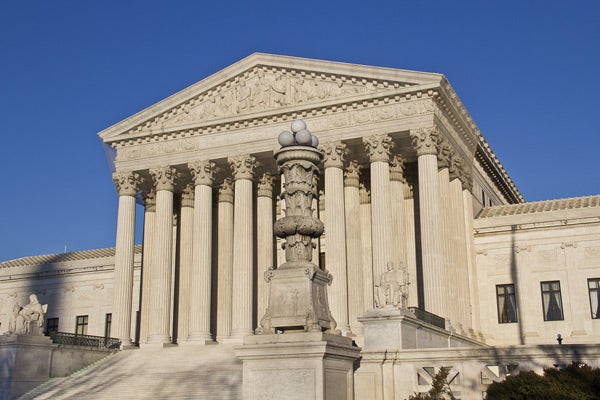|
January 23, 2013
White Republicans and Southern evangelicals most likely to claim reverse discrimination, Stanford research finds
Whites who perceive anti-white bias draw from different communities in different parts of the country: evangelical churches in the South, and the Republican Party elsewhere. By Max McClure

As the Supreme Court considers Fisher v. University of Texas, a so-called 'reverse discrimination' case, Stanford researchers have studied which white people were most likely to say they were discriminated against because of their race. (Photo: Mesut Dogan / Shutterstock.com) With the affirmative action case Fisher v. University of Texas before the Supreme Court, "reverse discrimination" is back in the public eye.
Perceptions of reverse discrimination – so-called because it involves bias against whites, rather than against minorities – are not new, and have been building among American whites for decades. However, the phenomenon is little-studied, in part because some assume such claims by white Americans have little merit.
"We talk about whites who claim reverse discrimination a lot, but we don't often study them systematically, " said Stanford sociology Professor Aliya Saperstein. "The issue of reporting racial discrimination is such a loaded one. So, we were curious about who the white people were who would say out loud to a survey interviewer that they had been treated unfairly because of their race. What makes them different?"
Using data from a 2006 survey of American racial and religious diversity, Saperstein, along with fellow sociologist Damon Mayrl, found that the answer varies depending on where you are. In the South, the most likely discrimination reporters are evangelical Christians. Elsewhere, it's Republicans.
The reasons for this aren't ideological – the specifics of people's religious or political beliefs seem to make no difference. Instead, the researchers suggest, Southern evangelical churches and the GOP are acting as regional communities for racially disaffected whites.
The findings show that common stereotypes of white people concerned with "reverse racism" – the stereotype of the "angry white male," for instance – are not the whole story. While the study shows whites who report racial discrimination are more likely to be recently unemployed and pessimistic about their future, they are also more likely to say they have daily contact with non-whites, and count at least one non-white person among their eight closest friends.
"You have to look beyond the simple view of who's claiming racial discrimination," said Mayrl, a professor at Universidad Carlos III de Madrid and first author on the study. "There is no singular profile of the white discrimination reporter."
The paper is currently available online ahead of publication in Social Science Research.
Real-world consequences
It's often difficult to say whether claims of discrimination are real or imagined. Still, the mere perception of racial prejudice can have real-world consequences.
For instance, Saperstein said, both whites and minorities who feel racially discriminated against experience worsened mental and even physical health. Discrimination reporters have also been found to trust the government less and to experience more negative relationships with family members.
"Perceiving discrimination has a host of consequences for well-being," she said. "Not just for individuals, but for society as a whole. It almost doesn't matter whether they really experienced any unfair treatment; what matters is they believe they did."
Objectively real or not, the researchers found that 8 percent of whites nationwide said they had experienced racial discrimination in the past three years. This number was significantly higher in the South, jumping to 11 percent.
Southern evangelicals overrepresented
Particularly overrepresented among Southerners reporting racial discrimination were evangelical Protestants, who accounted for 60 percent of the reverse discrimination reports in the South.
Other sociologists have suggested a connection between evangelical Christianity's individualistic theology and how evangelicals understand racial inequality. But neither theology nor devotion – how often they prayed, how often they went to church – affects the likelihood of white Southern evangelicals reporting racial discrimination.
Instead, the researchers point to the church's historical role as a booster for the racial order of the Old South. Southern evangelical churches were involved in morally justifying slavery before the Civil War and in defending segregation well into the 20th century.
"Southern evangelical churches appear distinctive from churches elsewhere, and we think that has to do with how they have helped their members understand the racial order in the past," said Mayrl. "We're taking the focus a little off the theology and putting it on the social structures in which people live."
Republicans also regionally distinct
Outside the South, evangelicals were no more likely to report racial discrimination than any other group. Republicans, on the other hand – who report at average or below-average rates in the South – were significantly more likely to say they had been treated unfairly on the basis of their race.
The political conservatism of someone's beliefs did not help explain the likelihood that whites would perceive discrimination. Simply identifying as a member of the Republican Party was what mattered.
Why this regional difference?
The researchers point to the fact that, outside the South, evangelical churches developed a different approach to race relations than their Southern counterparts. Meanwhile, the Republican Party has actively pursued white voters who felt wronged by such policies as civil rights programs or affirmative action.
By serving as a haven for disaffected whites, the researchers say, the Republican Party outside the South may occupy the same institutional niche the evangelical church fills in the South.
"We can't say whether these organizations are simply more attractive to whites who feel they have experienced discrimination, or whether they actually encourage whites to understand their situation in terms of racial discrimination," said Mayrl. "But it's clear that white discrimination reporters find different communities of support in different parts of the country."
-30-
|